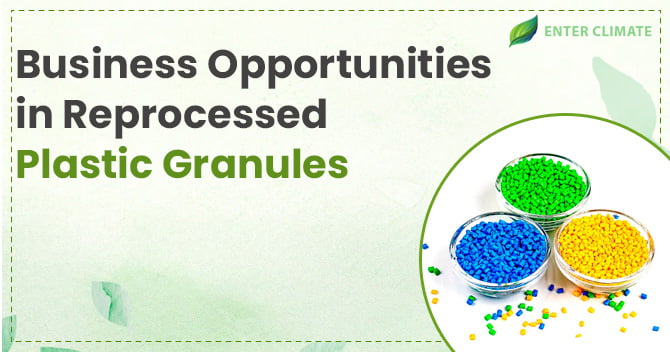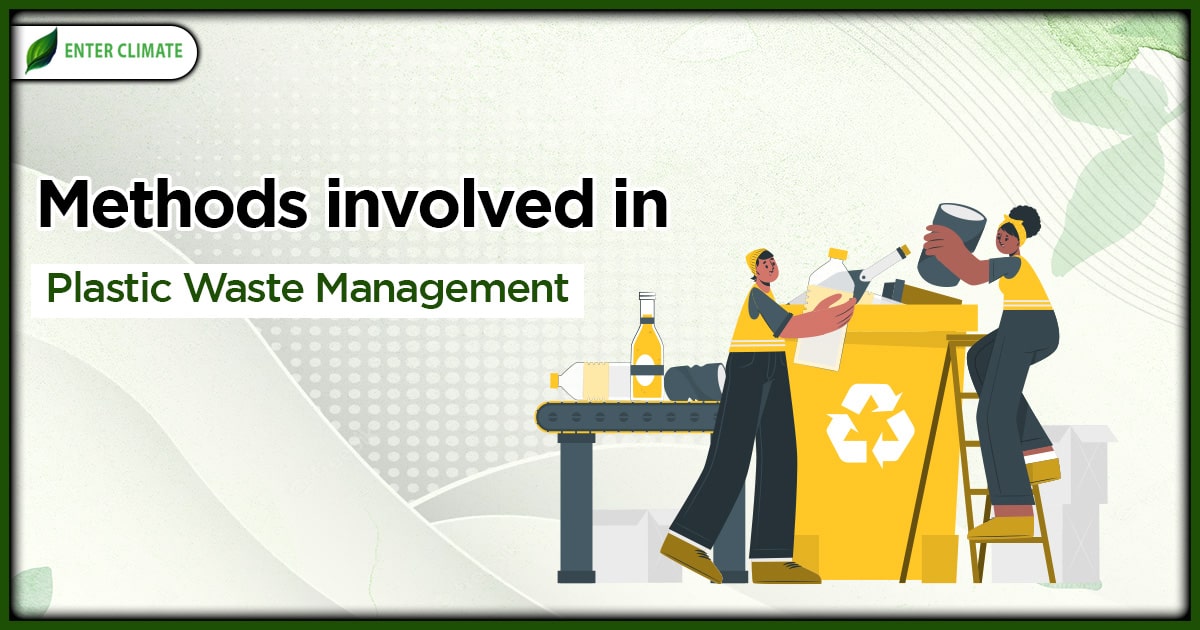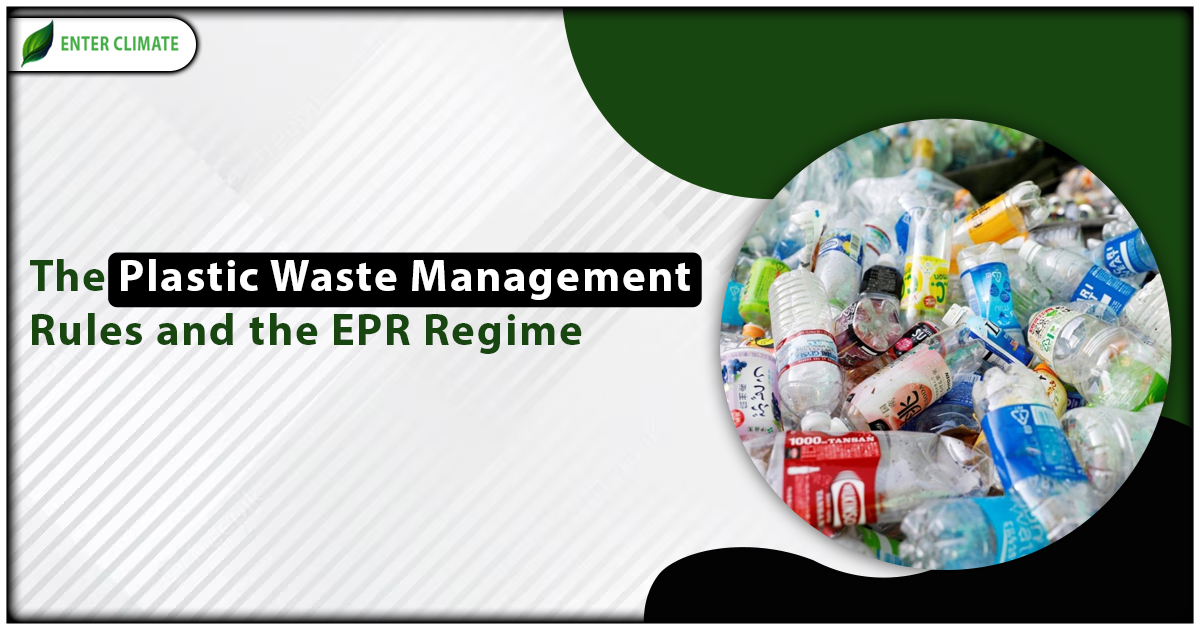Business Opportunities in Reprocessed Plastic Granules: An Overview
 26 Jul, 2022
26 Jul, 2022 
Plastic has played an essential role in the development of the modern-day world. From simple toys to space suits, plastic use has been ubiquitous. Plastic is considered by many to be a necessary evil, something we can’t live without. But the uncontrolled usage of plastic has led to a huge waste problem in many countries, including India. With reuse not being a feasible approach in the case of plastic waste, specific reprocessing approaches to manage the waste plastic gradually emerged. The plastic reprocessing industry is based on a similar approach of turning waste into wealth and has proven a profitable way of dealing in plastic waste. With the advent of modern technologies in the recycling industries, the cost of recycling plastic waste has also decreased significantly. Many new businesses have evolved in and around plastic waste in the form of waste to oil, waste-to-energy and road construction businesses, but the most lucrative business for many still is the reprocessed plastic granules business. These businesses realised the future potential in managing plastic waste and have flourished in the supportive environment provided by the government in many countries worldwide. The plastic reprocessing business is also the top pick among plastic waste processors in India. Due to its low investment, raw material availability and demand for the product in numerous industries, many waste recyclers have started small and medium-scale reprocessing businesses across the country. To understand the opportunities in the reprocessed plastic granules business, we first need to understand the critical elements of this business. Let’s begin by understanding what reprocessed plastic granules are.
Characteristics of Reprocessed plastic granules
Reprocessed plastic granules are small homogenous pieces of thermally processed plastic waste. They have physical and chemical properties similar to new plastic made with crude oil and therefore act as a quality substitute for virgin plastic. It is made by recycling and reshaping thermoplastic waste. The collected plastic waste goes through five stages,i.e.identification and classification, sorting, washing, shredding and extruding before it can be transformed into reusable plastic.
Use of ReprocessedPlastic Granules
Most commonly used plastics today are polyethylene terephthalate (PET), high-density polyethylene (HDPE), polypropylene (PP), and low-density polyethylene (LDPE). A thermoplastic is a linear polymer that can be melted, shaped and reused. Polyethylene, PVC, polystyrene, nylon, and acetate are examples of such plastic. Reprocessing is possible in all the above examples of plastic waste. Reprocessed plastic granules can be used in many industries that require plastic as a raw material. Reprocessed plastic granules can also be used in reinforced composites, compression molding, powder coating, 3D printing etc.
Factors which are driving its demand for the Plastic Granules
Plastic reprocessing is presently the most effective way of recycling waste plastic in the country. They do not require sophisticated machinery or technology. Also, reprocessed plastic is cheaper than virgin plastic and delivers almost comparable characteristics. Reprocessed granules, therefore, remain in high demand in the price-sensitive markets of India. Following are some critical factors driving the growth chart in favour of the reprocessed plastic business.
Low investment and Immediate Returns: A plastic reprocessing plant can be set up comparatively easily compared to units manufacturing plastic through crude oil. While using waste plastic to make fuel is profitable, it requires high capital investment, which is not the case in a reprocessed plastic granules business.
Huge range of the Product: Reprocessed plastic granules come in various types depending on what category of plastic waste was used in its manufacturing and the standards of washing and cleaning deployed. While PP is the most widely used plastic today, reprocessed PP granules are the most common. HDPE plastic waste is the easiest to recycle and reprocess. Reprocessed HDPE plastic granules are used to make ropes, toys bins, containers, etc.
Low Production Cost: production cost in a reprocessed plastic granules trade depends on the cost of raw material, segregation, treatment and processing. The raw material, i.e. plastic waste, is cheap and widely available. Also, the processing costs are comparatively less as plastic waste goes through simple pre-production stages of segregation, washing and shredding. Except for PET plastic, the reprocessing cost for all other plastic waste into granules is less when compared to the traditional manufacturing through crude oil.
Easy Manufacturing Process: Plastic waste is shredded, melted and given the shape of granules. It is a relatively simple process and does not require a highly skilled and technical workforce.
Wide range of applicability: recycled plastic can have high-end use like constructing wall panels and flooring. Other uses include manufacturing garbage cans, furniture, and other durable materials. Reprocessed plastic granules businesses can manufacture a variety of such granules in different sizes and colours to meet the requirements of manufacturing and the manufacturer’s demand.
Opportunities in Plastic Reprocessing Business
In recent times, governments worldwide have shifted from linear to circular economy model, which involves new business models, strategies and innovations focusing on optimizing the recycling process related to a product. Some examples of industries that use reprocessed plastic are as follows.
- PP Granules – For injection moulding, Raffia Bags, Plastic Furniture and Household
- LDPE Granules – for making Pipe, Film, Moulding, Sheets etc.
- HDPE Granules – for making Pipes, Crates, households, Films, Drums etc.
- HIPS Granules –making disposable products and sheets (used in packaging, construction, agriculture etc.)
- ABS Granules –For parts of Automobile, Mixture, Cooler, Engineering products etc.
Many additional opportunities apart from reprocessing plastic granules can be explored as this business is centered on the recycling approach. The existing businesses can also explore opportunities by venturing into the manufacturing sector that produces plastic products from reprocessed plastic granules like
- Plastic bottles manufacturing units
- Plastic Films production
- Rigid plastic and Foam manufacturing
- Plastic Fibres manufacturing
Some application-based businesses that use reprocessed plastic can also be explored like
- Non-Food contact packaging
- Plastic items used in construction
- Parts manufacturing for the Automobile industry.
Setting up a Reprocessed Plastic Business
Setting up a reprocessed plastic business is relatively easy. Thorough market research and capital investment in the manufacturing unit are the prerequisites. However, obtaining all necessary authorisation and business licences can be hectic and confusing due to various regulations governing this segment. This calls for assistance from experts in the field who can simplify your plastic waste business’s incorporation and registration requirements. Relevant business licenses and authorisation should be obtained before starting a reprocessing business. Here are the necessary authorisations required for a plastic items business.
Business Registration Certificate: Registering the business with appropriate authorities will help obtain subsequent NOCs from the different authorities like the Central Pollution Control Board and State Pollution Control Board (SPCB).
Factory licence: The manufacturer must register the premise with local authorities as per section 6 of the Factories Act, 1948[1].
No Objection Certificate: the Consent to Establish (CTE) and Consent to Operate (CTO) are the necessary approvals given by the concerned SPCB/PCC, which show that the establishment has taken all necessary measures to make their business non-polluting.
Fire NOC: This certificate is granted by the concerned fire department to ensure that commercial property is built with adequate fire-resistant measures.
Conclusion
Plastic has many unique properties that push it to the front of materials that can be recycled. Reprocessing has helped to extend the presence of the same plastic in the market by recycling it repeatedly. The reprocessed plastic granules find wide usage among manufacturers of plastic-related products depending on their chemical and thermal properties. The consumption of plastic is also increasing day by day, with the government restricting the production of single-use plastic and regulating plastic production in different ways. The reprocessing plastic granules business can be seen as a safe bet in these circumstances as such businesses are seen as an environmentally conscious step to towards plastic recycling and sustainable governance. The Government of India is also implementing different policies in plastic waste management and introducing recycling programs to control waste production and promote sustainable plastic disposable solutions.













